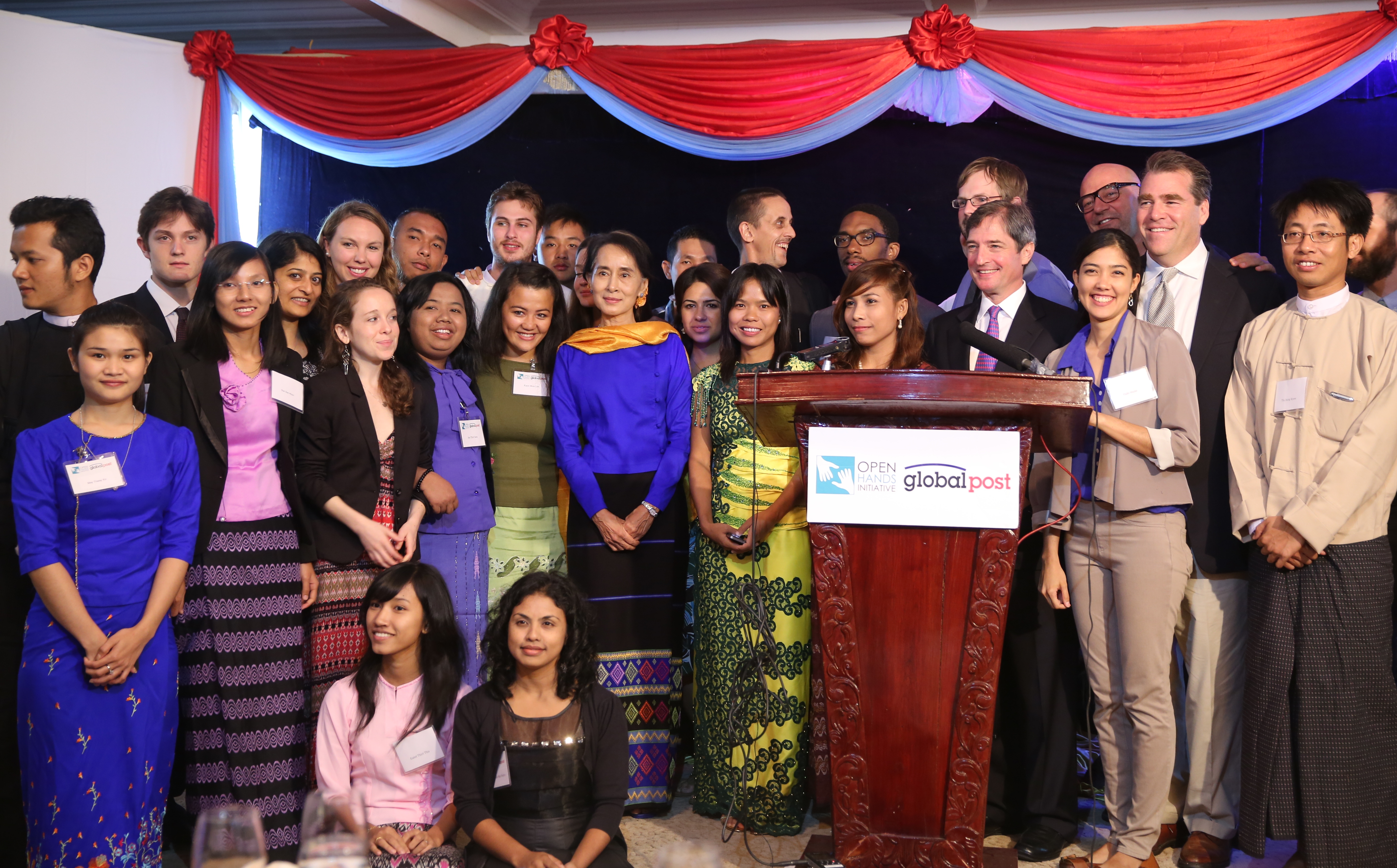By Jay T. Snyder
Founder, The Open Hands Initiative
The Open Hands Initiative Journalism Fellowship that we co-sponsored with GlobalPost and The GroundTruth Project has wrapped up after a tremendously successful three weeks in Myanmar. Our fellows -- 10 American and 10 Burmese -- honed their journalism skills, broadened their knowledge of the region, formed true friendships and had the opportunity to talk with top leaders including an inspirational evening with Daw Aung San Suu Kyi.
The reporting fellows pose with Daw Aung San Suu Kyi. (Photo Credit: Jonathan Wu)
The cohort began the fellowship with intense classroom training led by our top-notch instructors who guided them in improving their reporting skills in news videography and photography, radio broadcasting and news writing. They talked with historians, academics and veteran journalists from the region. Thant Myint-U, the highly regarded lecturer and author of two books on Burma provided the fellows with an overview of the history of the country and the region as well as the political challenges facing both. Bertil Lintner, the Swedish journalist and author who was blacklisted in Burma in 1985, gave his take on the current political situation and the prospects for democracy taking root in Burma. Denis Gray, the former AP Bureau Chief in Bangkok, mentored fellows on how to make the complex subjects in Southeast Asia interesting and understandable to readers.
Breaking into five smaller groups, the fellows spread out across Burma to report on all of the dramatic changes that are sweeping the country. Along the Burma Road, fellows navigated the historic switchback roads to assess the level of Chinese influence in the region as a result of the billion dollar investments it has made in Burma's energy infrastructure and whether or not America has challenged China's position in any significant way.
For the team that was deployed to the former capitals of Bagan, Mandalay and the current capital of Nay Pyi Daw, the fellows examined the politics surrounding the preservation and restoration of its spectacular ancient and peaceful Buddhist temples in Bagan, but also the rising militancy of political Buddhism in Mandalay where Wirathu, a Buddhist monk, is leading a national campaign against Myanmar's Muslims. In Nay Pyi Daw, the team focused on how well the country's transition to democracy is fairing and what its prospects are for the future.
To the south-east of Mandalay lays beautiful Inle Lake, a 45 mile long stretch of water high on the Shan Plateau where large hydroponic gardens have been created in the middle of the lake. On this journey, our fellows took a look at how the fragile ecosystem of the lake is being compromised by economic forces that are in conflict with one another: farmers using toxic fertilizers in their floating gardens are increasing the pollution on the lake threatening the livelihood of fishermen; rising tourism on the lake brings much-needed revenue but also threatens the environmental preservation of the lake. The Inle team took an in-depth look at these concerns -- including staying in the homes of farming and fishing families to better understand their circumstances while also investigating what measures, if any, the government was taking to mitigate these issues.
In Burma's Irrawaddy Delta, the team based here assessed the slow pace of economic recovery in the aftermath of the 2008 Nargis cyclone that killed an estimated 138,000 people and devastated the region. Corruption, lack of infrastructure and poor access to healthcare continue to depress the region's economic prospects.
Lastly, our team in Yangon evaluated the impact of rising foreign investment and what that will mean for the country's industrial base and labor sector in the next several decades, particularly in the garment and textile sectors.
Coming back from these journeys exhausted but thrilled by all they had experienced, the fellows began submitting their stories to their editors and preparing for our OHI GlobalPost capstone event: the opportunity to meet and talk with Nobel Laureate and Member of Parliament, Daw Aung San Suu Kyi at a dinner we held in her honor Nay Pyi Daw. In a photographic exhibit of the five journeys, each team member had a chance to talk with Daw Suu about their experiences. In her inspirational remarks, Daw Suu spoke about the power of the press and the need for integrity, fairness and accuracy in reporting. She praised the work of our program and encouraged our young fellows to persevere and continue telling their stories to ensure that Burma becomes deeply rooted in the best values of freedom and democracy. It was a magical evening and a terrific conclusion for our program in Burma.
Finally, the last piece of the program lets the hard work of the fellows take center stage. Today, GlobalPost will publish a 20-part "Special Report" encompassing all of the rich and nuanced stories uncovered by the young reporters. Exposés, photo vignettes, short videos and audio portraits will be republished by various national and international media outlets, allowing these stories to reach the masses. Through our partnerships in Myanmar, the report will impact more than 8 million listeners and readers, or about 15 percent of the country. In the U.S., it will reach another 5 million.
Most importantly, I am proud to report that the program exceeded all of the goals we had laid out for it. In the field, in the classroom, over dinners and deadlines, our Burmese and American fellows connected. They shared stories and perspectives making true friendships along the way. They deepened their knowledge of both Burma and the United States and sharpened their reporting skills. It was true testament to people-to-people diplomacy and the OHI mission.
